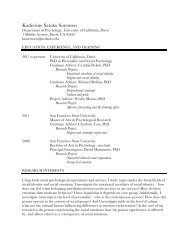The Psychology of Creativity:
The Psychology of Creativity:
The Psychology of Creativity:
You also want an ePaper? Increase the reach of your titles
YUMPU automatically turns print PDFs into web optimized ePapers that Google loves.
History <strong>of</strong> <strong>Creativity</strong> Research 24<br />
References<br />
Albert, R. S. (1975). Toward a behavioral definition <strong>of</strong> genius. American Psychologist, 30, 140-151.<br />
Albert, R. S., & Runco, M. A. (1999). A history <strong>of</strong> research on creativity. In R. J. Sternberg (Ed.), Handbook <strong>of</strong><br />
creativity (pp. 16-34). Cambridge: Cambridge University Press.<br />
Amabile, T. M. (1996). <strong>Creativity</strong> in context. Boulder, CO: Westview.<br />
American heritage electronic dictionary (3rd ed.). (1992). Boston: Houghton Mifflin.<br />
Andreasen, N. C., & Canter, A. (1974). <strong>The</strong> creative writer: Psychiatric symptoms and family history.<br />
Comprehensive Psychiatry, 15, 123-131.<br />
Arnheim, R. (1962). Picasso’s Guernica: <strong>The</strong> genesis <strong>of</strong> a painting. Berkeley: University <strong>of</strong> California Press.<br />
Arnheim, R. (1971). Art and visual perception: A psychology <strong>of</strong> the creative eye. Berkeley: University <strong>of</strong> California<br />
Press.<br />
Babcock, W. L. (1895). On the morbid heredity and predisposition to insanity <strong>of</strong> the man <strong>of</strong> genius. Journal <strong>of</strong><br />
Nervous and Mental Disease, 20, 749-769.<br />
Barron, F. X. (1963). <strong>Creativity</strong> and psychological health: Origins <strong>of</strong> personal vitality and creative freedom.<br />
Princeton, NJ: Van Nostrand.<br />
Barron, F. X. (1969). Creative person and creative process. New York: Holt, Rinehart & Winston.<br />
Berlyne, D. E. (1965). Structure and direction in thinking. New York, Wiley<br />
Boden, M. A. (1991). <strong>The</strong> creative mind: Myths & mechanisms. New York: BasicBooks.<br />
Bowers, K. S., Farvolden, P., & Mermigis, L. (1995). Intuitive antecedents <strong>of</strong> insight. In S. M. Smith, T. B. Ward, &<br />
R. A. Finke (Eds.), <strong>The</strong> creative cognition approach (pp. 27-51). Cambridge, MA: MIT Press.<br />
Browning, D. C. (1986). <strong>The</strong> complete dictionary <strong>of</strong> Shakespeare quotations. New York: New Orchard Editions.<br />
Campbell, D. T. (1960). Blind variation and selective retention in creative thought as in other knowledge processes.<br />
Psychological Review, 67, 380-400.<br />
Candolle, A. de (1873). Histoire des sciences et des savants depuis deux siècles. Geneve: Georg.<br />
Cattell, R. B., & Butcher, H. J. (1968). <strong>The</strong> prediction <strong>of</strong> achievement and creativity. Indianapolis: Bobbs-Berrill.<br />
Cox, C. (1926). <strong>The</strong> early mental traits <strong>of</strong> three hundred geniuses. Stanford, CA: Stanford University Press.<br />
Csikszentmihalyi, M., & Sawyer, K. (1995). Creative insight: <strong>The</strong> social dimension <strong>of</strong> a solitary moment. In R. J.<br />
Sternberg & J. E. Davidson (Eds.), <strong>The</strong> nature <strong>of</strong> insight (pp. 329-364). Cambridge, MA: MIT Press.
















